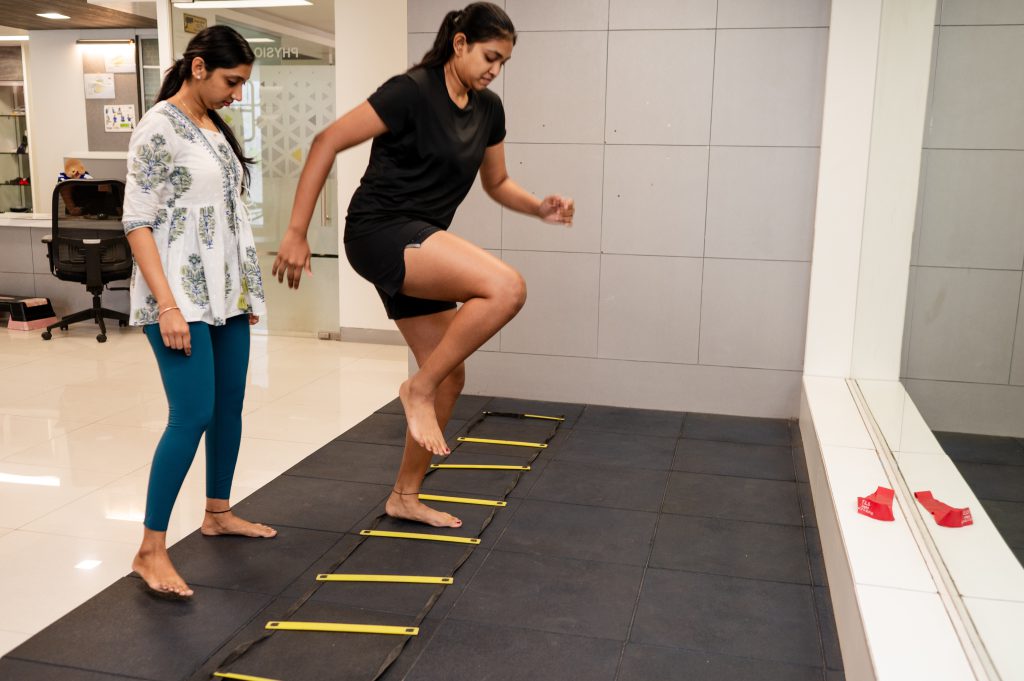Life is a roller coaster ride in which sports has lot to do a bigger role in shaping the individual’s personality and overall growth as an individual. Have you ever seen someone run to help an injured player during a cricket or football match? That person is often a sports physiotherapist. Sports physiotherapists play an important role in keeping athletes healthy, strong, and ready to perform their best. But their job is not easy!
In this blog, let’s explore what a sports physiotherapists does, the challenges they face, and how physiotherapy is different from sports coaching.
Playing a sport or learning a sport has lot many advantages than one can imagine.
Sports teaches you
- Multi-tasking, co-ordination
- Mental strength and patience to pursue what you want till you fail and get up way stronger
- Judgements and risk taking involving taking decisions on the spot
- Interpersonal relationship and not letting it affect your game
- Game spirit; letting go of the unlikely events and memories
What Is a Sports Physiotherapist?
A sports physiotherapist (or sports physio) is a health expert who helps athletes recover from injuries, prevent future injuries, and improve their physical performance. They are trained in the science of human movement and body mechanics.
Whether it’s a sprained ankle, muscle tear, or shoulder pain, a sports physio helps treat the problem using exercises, stretches, massage, and special machines like ultrasound or electrical stimulation
A Day in the Life of a Sports Physiotherapist
The daily life of a sports physio can be busy and exciting. Here’s what a typical day might look like:
Early Mornings
Most sports teams start training early. A physio needs to arrive before practice begins to:
- Set up equipment
- Tape or bandage joints
- Stretch athletes
- Warm up muscles
️During Training
During practice sessions, the physio:
- Watches closely for any injuries
- Offers immediate help if someone gets hurt
- Gives advice on posture, form, and movement
- Works with the coach to adjust training
After Practice
Once training ends, the physio:
- Treats injuries (like ice packs, massage, taping)
- Guides recovery exercises
- Keeps notes on every athlete’s condition
- Plans rehab programs for injured players

Match Days
Game days are the most intense! A physio:
- Travels with the team
- Carries a medical kit
- Stays alert for on-field injuries
- Makes quick decisions: Can the player continue, or should they stop? Learn more
Top Challenges Sports Physiotherapist Face
Being a sports physio is rewarding, but it comes with many challenges:
1. Pressure to Fix Fast
Athletes, coaches, and fans want quick results. Physios often face pressure to help players return quickly—even before they are fully healed.
2. Emotional Stress
When a player gets a serious injury, it affects the whole team. The physio must stay calm, confident, and supportive during tough moments.
3. Long Working Hours
There are early mornings, late evenings, weekend matches, and travel days. It’s not a 9 to 5 job.
4. Dealing With Multiple Opinions
Coaches, doctors, team managers, and sometimes even parents have different views. The physio must stay professional and give honest advice.
5. Staying Updated
New research, tools, and treatment methods are coming out all the time. Sports physios need to keep learning to stay at the top of their game.
How Is Physiotherapy Different From Coaching?
While both physiotherapists and coaches work closely with athletes, their roles are very different. Let’s understand how:
Physiotherapist’s Role
- Focus on health and injury
- Helps players recover from pain, stiffness, or injury
- Uses treatment techniques (massage, exercises, machines)
- Creates rehab programs
- Works one-on-one with injured players
- Aims for safe return to sport Read more

Coach’s Role
- Focus on performance and skills
- Teaches strategies, techniques, and game rules
- Plans training sessions
- Motivates and builds team spirit
- Prepares athletes mentally and physically for competition
- Aims for winning the game
Teamwork Between Physio and Coach
Even though their jobs are different, both the physio and coach work together for one goal: helping the athlete perform safely and at their best.
For example, if a player is returning from an ankle injury:
- The physio will guide safe exercises
- The coach will slowly involve them in light training
- Together, they’ll decide when the player is ready to play fully
Skills Every Sports Physiotherapist Needs
To be a good sports physio, one must have:
- Knowledge of body movements and sports injuries
- Communication skills to talk to athletes, coaches, and doctors
- Quick decision-making during emergencies
- Patience and empathy for players in pain
- Team spirit to work closely with others
Why Sports Physios Are So Important
Without sports physiotherapists, many players would not return to the game after injuries. They:
- Prevent injuries before they happen
- Help heal injuries faster and safer
- Support the mental health of athletes
- Increase confidence and performance levels
- Educate athletes about body care and posture
In short, they are the hidden heroes behind every successful athlete and team. Learn more
Final Thoughts
The life of a sports physio is filled with challenges, but it’s also very fulfilling. They get to travel, be part of teams, and play a key role in an athlete’s success. While coaches focus on improving the game, physios focus on improving the body.
Both are important. And when they work together, they help athletes reach their full potential—safely and successfully.
Dr. Aditi Dole (Sports Physiotherapist)
Rehab Station
